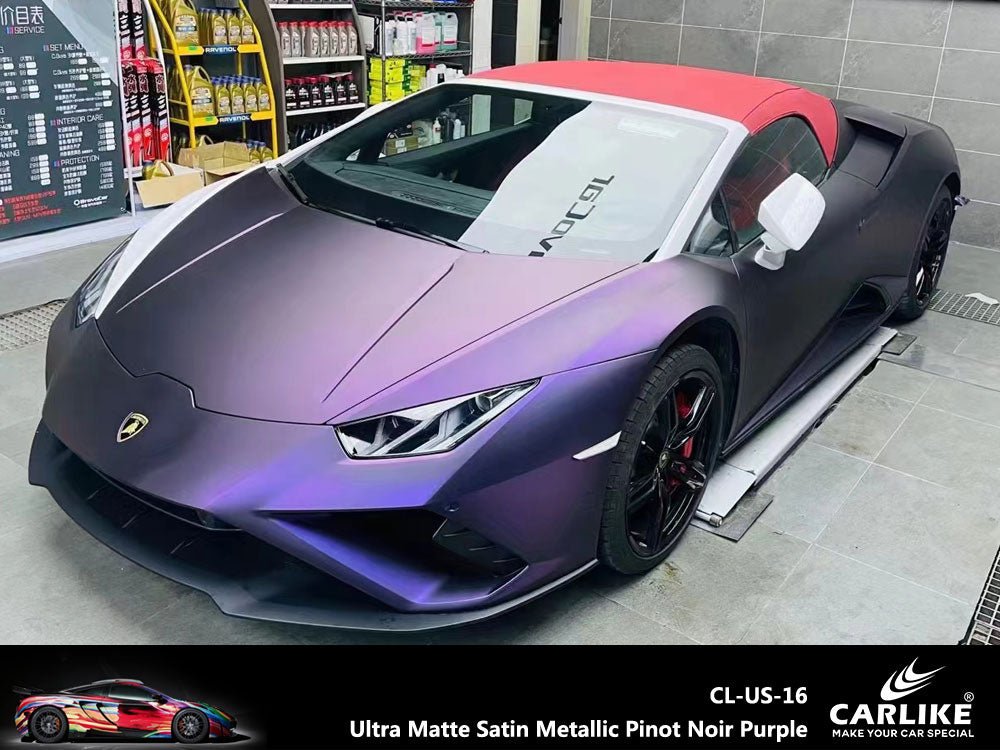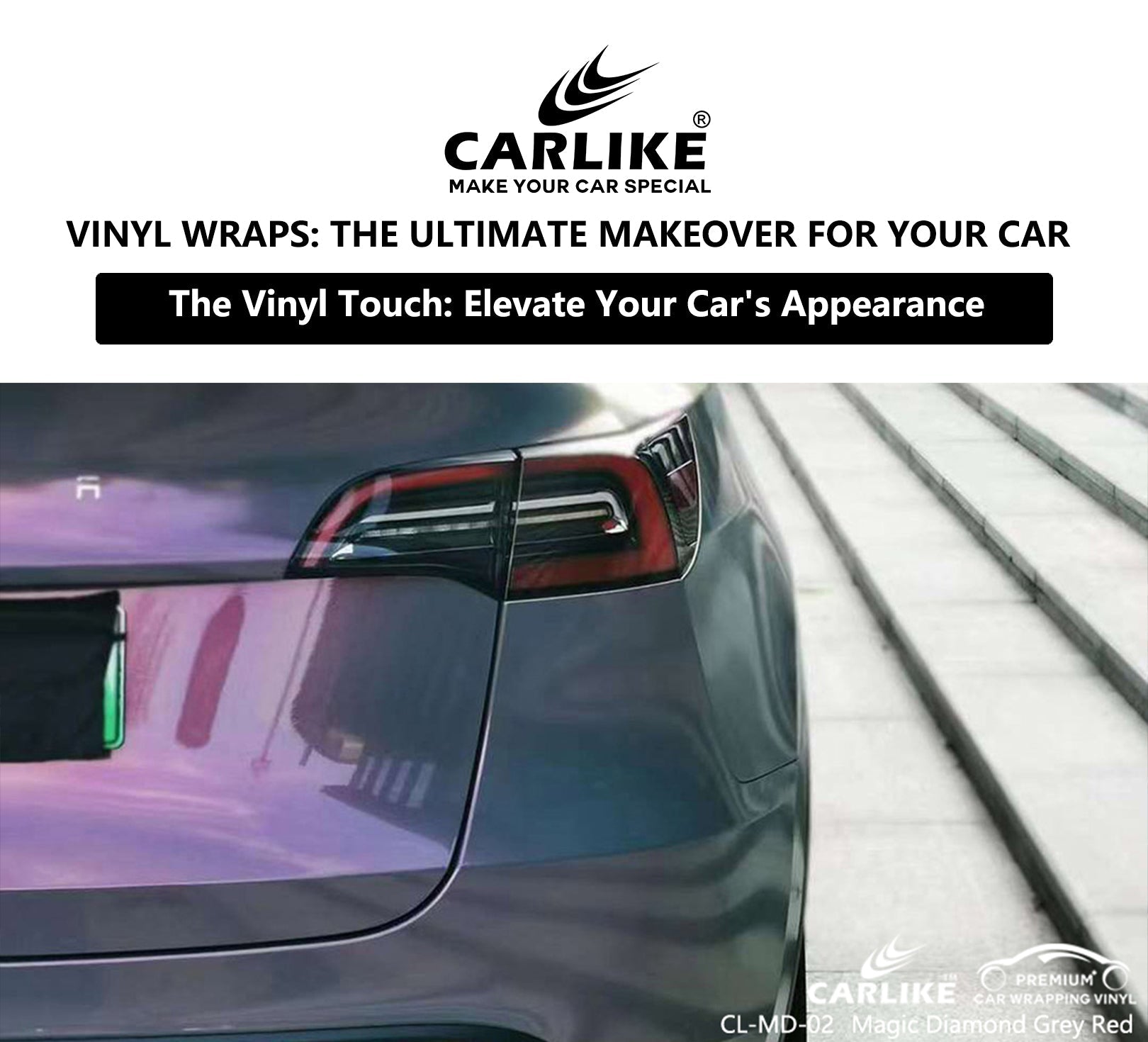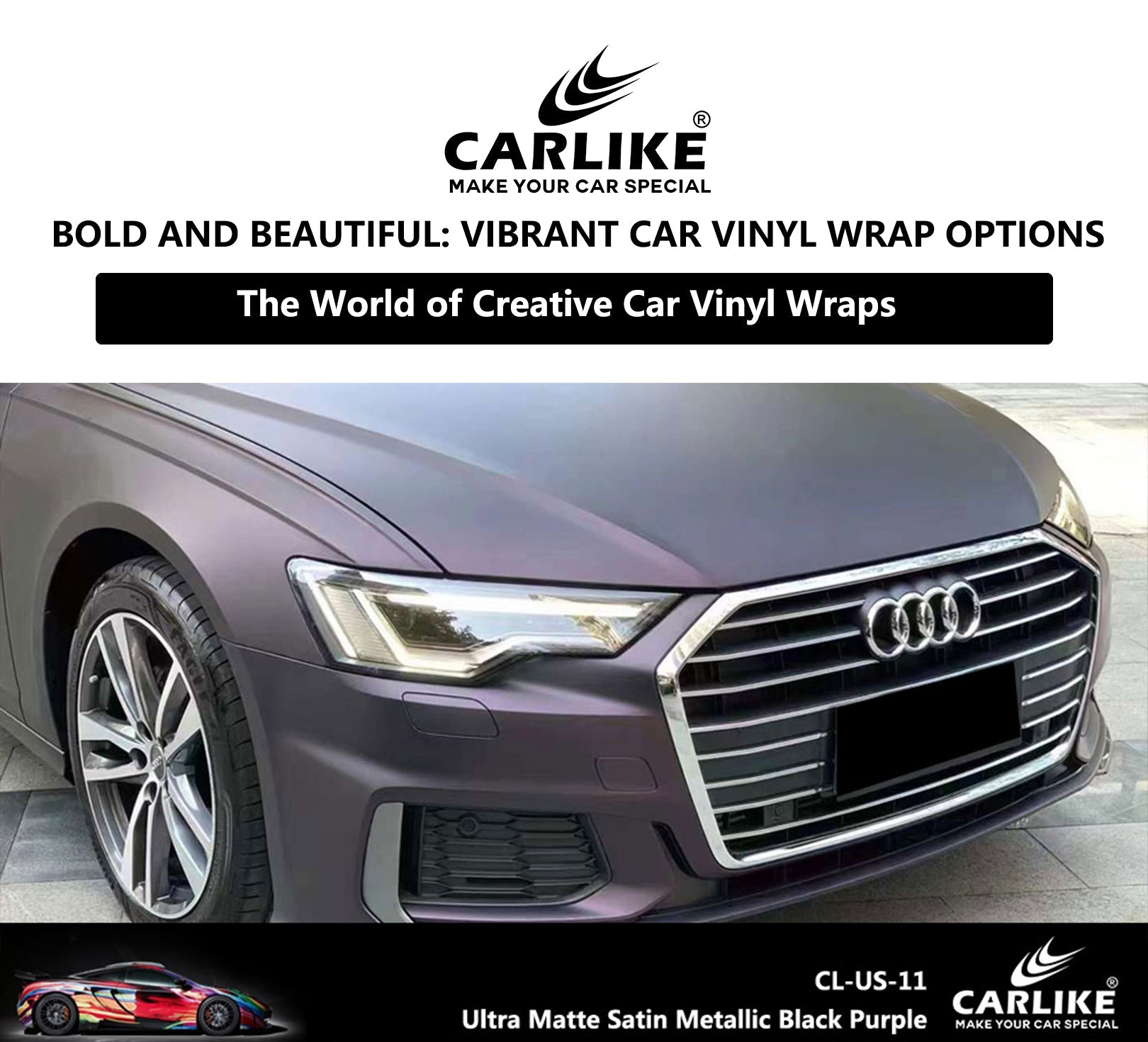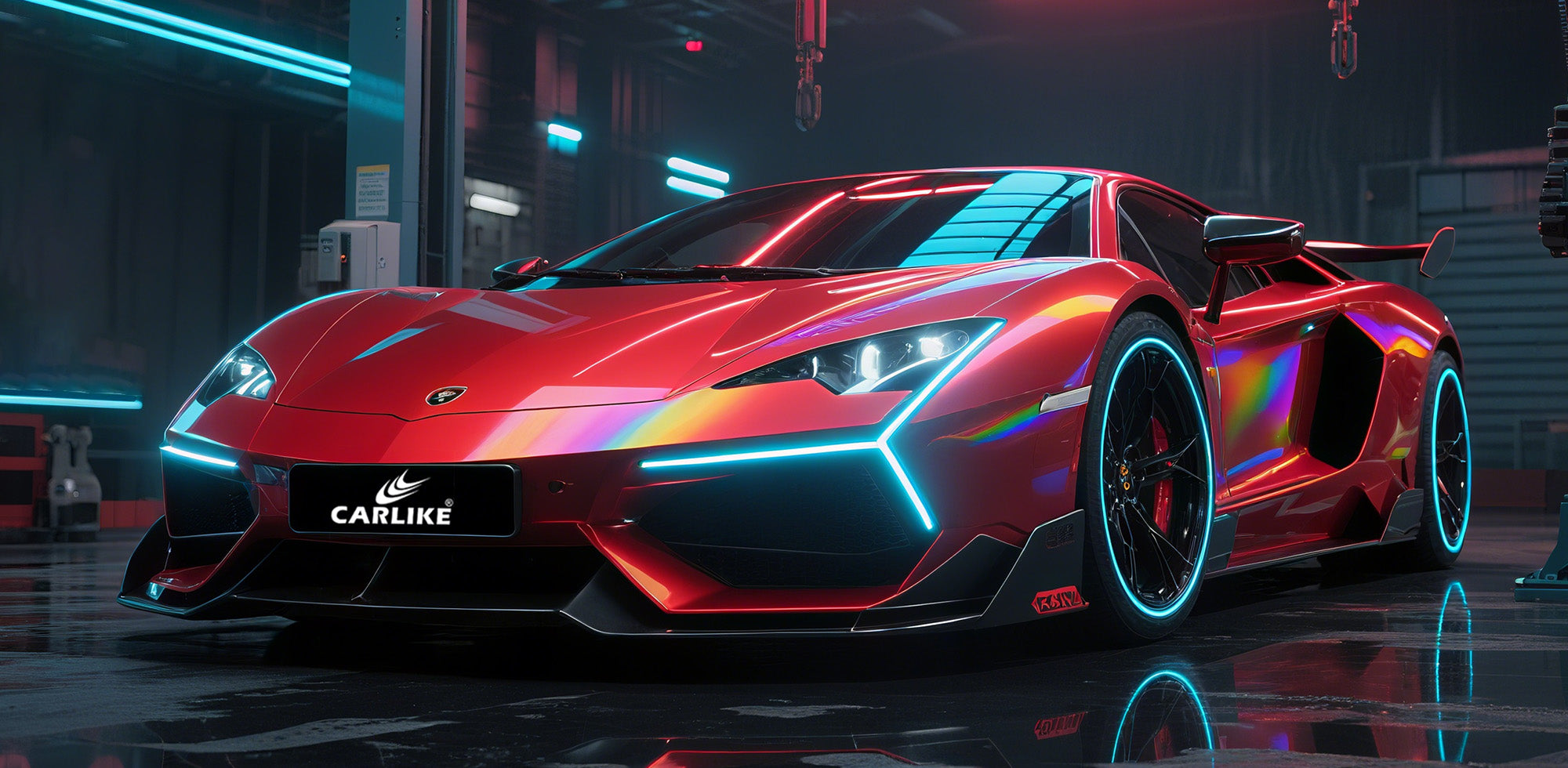Types of Vinyl Wrap Materials
Here's an explanation of different types of vinyl wrap materials:
1. Cast Vinyl vs. Calendared Vinyl:
- Cast Vinyl:
- Composition: Made by casting a liquid form of vinyl onto a backing paper, then cured through a heating process.
- Durability: More durable and long-lasting. It conforms well to the contours of the vehicle and is less likely to shrink over time.
- Application: Ideal for complex curves and contours, making it suitable for full vehicle wraps.
- Cost: Generally more expensive than calendared vinyl.
- Calendared Vinyl:
- Composition: Produced by extruding a solid form of vinyl through a series of rollers. It's less flexible than cast vinyl.
- Durability: Less durable and more prone to shrinking, especially in extreme weather conditions.
- Application: Suitable for flat or slightly curved surfaces. It's commonly used for decals, signs, and shorter-term applications.
- Cost: More cost-effective than cast vinyl.
2. Specialty Vinyl Wraps:
- Chrome Vinyl:
- Appearance: Highly reflective and mirror-like finish, available in various colors.
- Application: Adds a flashy, eye-catching look to vehicles and is popular for accents and detailing.
- Color-Shifting Vinyl:
- Appearance: Changes color or shifts hues depending on the viewing angle and lighting conditions.
- Application: Creates a dynamic and attention-grabbing effect, often used for accents or full wraps on high-end vehicles.
- Textured Vinyl:
- Appearance: Comes in various textures like carbon fiber, brushed metal, leather, and more.
- Application: Adds a tactile and unique visual element to the vehicle's surface.
- Matte Vinyl:
- Appearance: Provides a non-reflective, flat finish that can give a sophisticated and stealthy appearance to a vehicle.
- Gloss Vinyl:
- Appearance: Offers a high-gloss, shiny finish that gives a polished and vibrant look to the vehicle.
- Pearlescent Vinyl:
- Appearance: Contains pearlescent pigments that create a subtle, iridescent effect in various lighting conditions.
- Brushed Vinyl:
- Appearance: Mimics the look of brushed metal surfaces, adding a sleek and industrial aesthetic to the vehicle.
- Satin Vinyl:
- Appearance: Provides a satin or semi-gloss finish that strikes a balance between matte and gloss.
- Textured Vinyl:
- Appearance: Comes in various textures like carbon fiber, brushed metal, leather, and more.
- Application: Adds a tactile and unique visual element to the vehicle's surface.
- Wood Grain Vinyl:
- Appearance: Replicates the natural look of wood, offering a distinctive and rustic touch to the vehicle's interior or exterior.
These specialty vinyl wraps offer a wide range of options for customizing and personalizing vehicles to suit different tastes and styles. They can be used for accents, detailing, or even full wraps, providing a unique and eye-catching look.




Benefits of Using Vinyl Wrap
Here are some additional benefits of using vinyl wrap for cars:
1. Cost-Effective Alternative to Paint
- Vinyl wrapping is often more affordable than a high-quality paint job, making it an attractive option for those on a budget.
2. Preserves Resale Value
- A well-maintained vinyl wrap can protect the original paint underneath, helping to maintain the vehicle's resale value.
3. Non-Permanent Solution
- Unlike paint, vinyl wraps can be removed without causing damage to the original paint job. This is particularly beneficial for leased vehicles or for those who want to change the appearance of their car periodically.
4. Customizable and Unique Designs
- Vinyl wraps offer a wide range of design options, from intricate patterns to bold graphics. This allows for a level of personalization that is often not possible with traditional paint.
5. Wide Range of Colors and Finishes
- Vinyl wraps come in an extensive array of colors, finishes (such as matte, gloss, satin, and more), and textures, allowing for a truly customized look.
6. Protection from Harsh Elements
- Vinyl wraps act as a protective barrier against road debris, stone chips, bird droppings, and other environmental factors that can harm the car's original paint.
7. Quick Application and Installation
- The application of a vinyl wrap is typically faster than a paint job, reducing downtime and allowing the vehicle to be back on the road sooner.
8. Easily Repairable
- In the event of minor damage, such as scratches or scuffs, individual panels of a vinyl-wrapped car can be repaired or replaced without the need for a full re-wrap.
9. Virtually Seamless Finish
- When professionally installed, vinyl wraps can achieve a seamless appearance, giving the vehicle a sleek and uniform look.
10. Resistant to Fading and Oxidation
- High-quality vinyl wraps are formulated to resist fading and oxidation, ensuring a long-lasting and vibrant appearance.
11. Reduced Weight Compared to Paint
- Vinyl wraps are lighter than multiple coats of paint, which can slightly improve fuel efficiency.
12. Promotes Branding for Businesses
- For commercial vehicles, vinyl wraps offer a cost-effective way to advertise a company's brand, services, and contact information.
13. Easy to Clean and Maintain
- Vinyl wraps can be washed with regular car wash soap and water, making maintenance hassle-free.
14. Versatility for Partial Wraps or Accents
- Vinyl wraps can be applied to specific sections of a vehicle for a unique look, such as accentuating specific features or creating a two-tone effect.
Remember to emphasize these benefits in your blog post to provide a comprehensive understanding of why using vinyl wrap can be an excellent choice for car enthusiasts and owners.
Durability and Longevity
Here are the factors that can affect the lifespan of vinyl wraps, as well as tips on how to properly care for and maintain a vinyl-wrapped car:
Factors Affecting the Lifespan of Vinyl Wraps:
1. Quality of the Vinyl Material:
- High-quality, premium vinyl wraps tend to have a longer lifespan compared to lower-grade materials. They are often more durable and better at withstanding environmental factors.
2. Installation Quality:
- Proper installation by a skilled professional is crucial. Poorly installed wraps may peel, bubble, or lift prematurely.
3. Exposure to the Elements:
- Harsh weather conditions, such as extreme heat, cold, and UV exposure, can accelerate wear and deterioration of the vinyl wrap.
4. Usage and Wear Patterns:
- The more a car is driven, especially in areas with heavy traffic or off-road conditions, the more wear and tear the vinyl wrap will experience.
5. Maintenance and Cleaning Habits:
- Neglecting regular cleaning and maintenance can lead to the accumulation of dirt, debris, and contaminants, which can degrade the wrap over time.
6. Chemical Exposure:
- Contact with harsh chemicals or solvents (e.g., gasoline, certain cleaning agents) can damage the vinyl material.
7. Physical Damage:
- Scratches, impacts, or abrasions from objects like rocks, branches, or road debris can cause damage to the vinyl wrap.
8. Improper Removal:
- If a vinyl wrap is removed incorrectly or prematurely, it can cause damage to the underlying paint.

How to Properly Care for and Maintain a Vinyl-Wrapped Car:
1. Regular Cleaning:
- Wash the car with a mild, pH-neutral soap and water mixture. Avoid using harsh chemicals or abrasive cleaners.
2. Avoiding High-Pressure Washing:
- High-pressure washers can damage the edges of the vinyl, leading to premature peeling or lifting. Use a gentle stream of water.
3. Hand Drying or Air Drying:
- Pat the wrap dry with a microfiber cloth or allow it to air dry. Avoid using abrasive materials that could scratch the vinyl.
4. Avoiding Wax and Polishing Compounds:
- Waxing and polishing are not necessary for vinyl wraps and can sometimes harm the material. Check with the wrap manufacturer for specific recommendations.
5. Protecting Against Sun Exposure:
- Park the car in shaded areas or use a car cover when parked for extended periods to minimize UV exposure.
6. Handling Contaminants Promptly:
- Remove bird droppings, tree sap, bugs, or other contaminants as soon as possible to prevent them from bonding with the wrap.
7. Using a Sealant or Protectant (Optional):
- Some manufacturers offer sealants or protectants designed specifically for vinyl wraps. Follow the manufacturer's guidelines for application.
8. Professional Inspection and Maintenance:
- Schedule periodic check-ups with a professional to assess the condition of the wrap and address any issues early.
By following these care and maintenance tips, you can help extend the lifespan of your vinyl-wrapped car and keep it looking great for years to come.
FAQ for car vinyl wrap material?
Q: What are the different types of vinyl wrap materials available?
A: There are two main types of vinyl wrap materials: cast vinyl and calendared vinyl. Cast vinyl is more expensive but offers better conformability and durability. Calendared vinyl is more budget-friendly but may have limitations in terms of flexibility and longevity.
Q: How long does a vinyl wrap typically last on a car?
A: The lifespan of a vinyl wrap depends on various factors, including the quality of the material, installation, exposure to elements, and maintenance. Generally, a high-quality vinyl wrap can last anywhere from 5 to 10 years or more with proper care.
Q: Can I wash a vinyl-wrapped car like I would with a painted car?
A: Yes, you can wash a vinyl-wrapped car. It's recommended to use a mild, pH-neutral soap and water mixture. Avoid harsh chemicals and high-pressure washing, as they can potentially damage the wrap.
Q: Can I wax or polish a car with a vinyl wrap?
A: It is generally not necessary to wax or polish a vinyl-wrapped car. In fact, using certain wax or polishing compounds may harm the vinyl material. Check with the manufacturer for specific recommendations.
Q: Can a vinyl wrap be removed without damaging the car's original paint?
A: Yes, a vinyl wrap can be removed without causing damage to the original paint if it was properly installed and maintained. However, if the wrap was left on for an extended period or installed poorly, it may be more challenging to remove.
Final Words
In the realm of automotive customization, choosing the right vinyl wrap material is a pivotal decision that harmonizes aesthetics with practicality. The balance between visual impact and durability can transform a vehicle into a work of art that stands the test of time. Remember, the quality of the vinyl, its finish, and its suitability for the intended purpose are all crucial factors. Whether you're seeking a head-turning design or a protective shield for your prized possession, a well-informed choice ensures a stunning and enduring result. So, embark on your vinyl-wrapping journey with confidence, and let your vehicle's new look be a testament to the perfect blend of style and substance. Happy wrapping!








